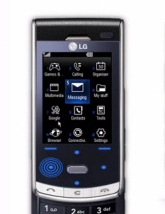Hands on with the LG Secret motion-sensing mobile games
We give M-Toy titles a try

The LG Secret is one of the more hotly anticipated mobile phones this year, offering a five-megapixel camera, a 2.4-inch touchscreen, and all manner of music, video and photography goodness.
But it's the accelerometer we're excited about. The Secret (also known as the KF750) is one of the new breed of handsets offering motion-sensing gaming – something LG is branding as 'M-Toy', with six preloaded games taking advantage.
Naturally, when we got the chance to have a go, I leapt in with both hands. The phone itself is a suitably stylish slider handset, which is slim but reassuringly heavy in the hand.
So what about those games? I'll take them in turn, starting with Dart. It's, yes, a darts game, where you tilt the phone left and right to aim, and then jerk it forward to throw – how fast you do that determines how high up the board your dart flies.
The tilting and jerking works really well, although it's a bit pot luck where your dart lands – the one time I hit a treble 20, I couldn't repeat it for the life of me.
The game itself is barely a game too – you throw three darts, see your score, and then start again – there's not an actual match to play. File under technical demo, albeit an impressive one.
Magic Ball is just that – a magic ball that you toss around the screen by waving the Secret, before pressing the button to get a verdict – "Ask me again later", "Very doubtful" and "Better not tell you now".
Thanks for that. The motion works very well, but I can't imagine why you'd fire it up more than once.
Maze has you guiding a red ball round a series of dynamically generated mazes to the hole at the end. It's smooth, but again, there's no game – for example, no scoring system based on how quickly you complete them.
Spotting a theme here? The M-Toy games seem to be more about showcasing the potential of LG's accelerometer technology, rather than being satisfying games in their own right.
Home Run Derby is the most appealing game so far, being a baseball-slugging mini-game where you have to shake the Secret at the right time to hit the ball as far as possible. It's basically a cut-down mobile version of the baseball game in Wii Sports.
Here, at least, you are scored for your efforts – your distance is measured – giving you a high score to aim at when playing again. The fifth game, Hammer follows suit, with you shaking the phone to spin and pressing the button to throw the hammer – with your distances being measured.
Both are very simple games, but show what the handset would be capable of in deeper sports games, which is presumably the point.
Finally, Fishing is a simple fishing game – jerk the phone forwards to cast, wait for a bite, then jerk it back in and see what you've caught. You get three attempts, and your total weight is added up at the end for a high score.
Playing the six M-Toy games is a bit of a frustrating experience, if I'm honest. The motion-sensing works very well – it's not too sensitive, and doesn't require wrist-spraining flicks to work.
But these are technical demos, not proper games. Playing Fishing made me wish for a Bass Fishing Mania style fishing sim to use the technology, while Home Run Derby is enough to make me happily pay a fiver for a full baseball sim. And I don't even like baseball that much.
In short: I'm very impressed with the LG Secret's accelerometer, but rather less so by the preloaded games.
It's a shame LG couldn't do what Sony Ericsson is doing with its F305, and get some established mobile publishers to convert some of their games before launch, to have embedded versions on the phone (or at least trials). There is a golf game, for example, but it doesn't use the motion sensor.
Still, if the LG Secret is as popular as its predecessors the Chocolate and the Shine, publishers will be rushing to support its accelerometer in their games. With that in mind, M-Toy is a tantalising glimpse at the treats to come.
